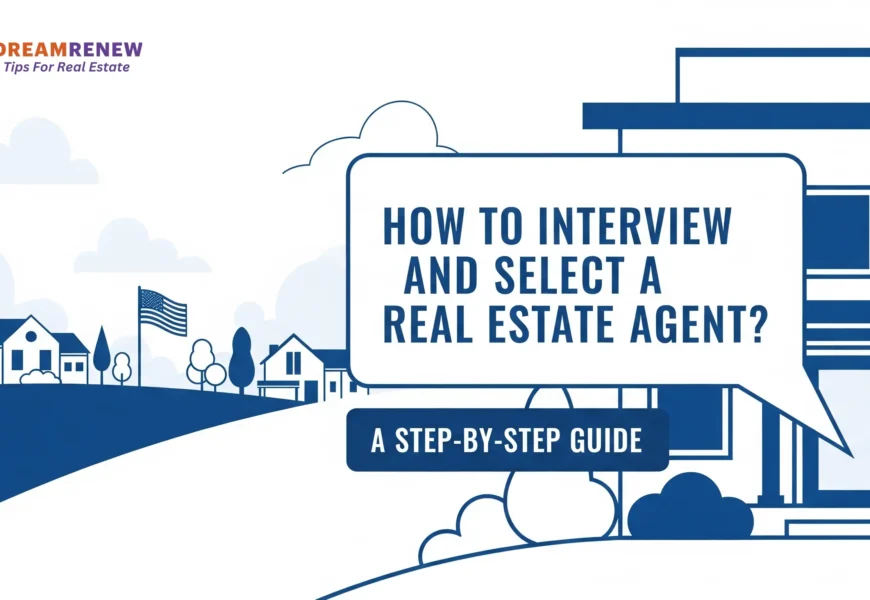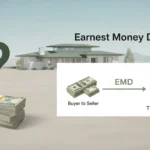Choosing the right real estate agent isn’t just about who has the most signs around your neighborhood or the biggest smile in their faces. It’s about selecting someone who can make or break your whole home buying or selling experience. Did you know that? Your agent is your advocate, strategist, and a guide who help you make one of your life’s biggest financial decisions.
Many people rush this decision, often going with a friend of a friend or the first person who answers their call. But skipping the interview process can lead to real-life problems. Just imagine losing out on your dream home because your unexperienced agent missed a show or priced your home too high as compare to the market because they didn’t know the local market well.
Pre-Interview Preparation
Even before calling an agent, it is necessary for you to do some research first. Begin with a straightforward list of possible agents that are obtained from your friends’ referrals, real estate websites such as Zillow or Realtor.com, or finding specialists in your area on Google who have positive reviews.
Consider if you require a buyer’s agent, a seller’s agent, or both. A buyer’s agent will deal with the necessary negotiations and represent your interests if you want to purchase a property, whereas a seller’s agent is mainly concerned with advertising and obtaining the highest price for your house.
Prepare a shortlist of questions and have key documents ready, such as your financing pre-approval (if buying) or your property tax info (if selling). It helps make the conversation smoother and easy.
Top Important Questions to Ask a Real Estate Agent
A good interview isn’t just about hearing what they say, it’s about knowing what to ask.
Here are some key questions that will give you real insight:
Experience and Credentials
Inquire about their duration in the real estate business, the number of deals they have completed last year and if they are experts in the same area or with the same kind of property as yours. Attempt to find certification such as CRS (Certified Residential Specialist) or ABR® (Accredited Buyer’s Representative).
Strategy and Local Market Knowledge
What is their plan to get your house sold quickly or find a new one for you in a short time? The right agent would definitely talk to you about how they set home prices, recognize good offers, and interpret local market trends.
Communication and Availability
Some agents are impossible to reach after signing. Ask how often they’ll update you and whether you’ll be dealing with them directly or their assistant. Make sure their schedule matches yours.
Commission and Contracts
Feel free to ask them how much they charge. Most agents receive a 5–6% commission that is split between the buyer and the seller parts. Read their contract carefully and also inquire if they have exclusivity, cancellation terms, and the duration of the agreement.
Get our free downloadable checklist PDF that includes all these questions so you can bring it to your interviews.
Red Flags to Watch When Interviewing a realtor
Even if someone seems polished, be alert for red flags. One common issue is vague answers if they can’t explain how they’ll market your home or why a neighborhood is hot, that’s a warning.
Another is slow communication. If they take days to reply during your first contact, imagine how responsive they’ll be when things get stressful.
It can be a potential concern if there are no recent online reviews or if your agent is not from the area you want. Good agents know their zip codes like the back of their hands, and can also reference recent sales easily.
One Redditor described how their agent “was super nice until the offer got accepted, then was missing for a week, when we needed to negotiate repairs.” Unfortunately, these kinds of stories happen way too often.
An Agent vs Real Estate Team
This is a decision many don’t even consider, yet it can drastically impact your experience.
A solo agents offer a personal touch and consistency, you deal with one person from start to finish. They often have more flexibility and fewer clients, so they can focus more on your deal.
Real estate teams, on the other hand, offer more bandwidth. You’ll likely work with different people for scheduling, showing, and paperwork, but the process can move faster because tasks are divided.
If you’re buying a home in a competitive market or selling under pressure, a team might offer the resources you need. For a more hands-on relationship, a solo agent could be the better choice.
Understanding Credentials and Certifications
Real estate certifications aren’t just alphabeting soup; they reflect an agent’s training and areas of expertise.
Here’s a quick look at what matters:
| Designation | What It Means |
| CRS | Advanced training in residential sales |
| ABR® | Focuses on buyer representation |
| SRES® | Specializes in working with seniors |
| SRS® | Seller-focused certification |
Agents with these designations have gone above state licensing and invested in becoming better at their craft.
Comparing Multiple Agents: Tools and Templates
To avoid decision fatigue, try using a side-by-side comparison. Evaluate agents on the same criteria—experience, commission, availability, and reviews.
Legal Considerations When Hiring a Realtor
Before you sign anything, know what you’re committing to. An exclusive agreement means you can’t hire another agent for a set time, so be sure you trust the person before locking in.
Understand what’s in the listing agreement: the commission percentage, the contract length, and the cancellation terms. If you’re a buyer, some agents may ask you to sign a buyer’s agreement read it carefully. And always ask about commission splits, especially if you’re buying a new home or using builder incentives.
Bonus Tips to Pick the Right Agent in Your Area

Local knowledge goes a long way. A top-rated agent in one city might not know the nuances of your neighborhood.
On websites such as Yelp or Google Maps you can find hyper-local reviews. Also, during an interview, you can ask questions that are specific to a certain area, for instance, “What’s the average days on market in this zip code?” or “Which streets are gaining value the fastest?”
Check out our dynamic guide for Top Interview Questions by City/Market to get the right answers for where you live.
Choosing the Agent That Feels Right
It’s all about trust at the end of the day. You need someone who makes you feel sure not only with words but also with the way they work and their actions. Data can be of assistance, but you shouldn’t dismiss your intuition.
And definitely don’t be scared to leave. If you feel like something is wrong or if you need more time to find what you really want, it’s perfectly fine. The perfect agent will be behind your decision and will not force you.
This is your experience. Take the lead of it with the right person next to you.
Commonly Asked Questions
How many agents should I interview?
Most experts would suggest speaking to not less than three agents for getting a suitable one.
What is the most important question to ask a realtor?
Ask them in what ways they are going to enable you to accomplish your objective—be it selling quickly, obtaining the highest price, or discovering an undiscovered treasure.
Should I sign a buyer’s agreement?
It depends. Buyer agreements can offer clarity but also limit your flexibility. Read the fine print.
Is it okay to work with multiple agents?
Generally no, especially if you’ve signed an exclusive agreement. But while you’re interviewing, you’re free to shop around.




